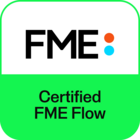Hello everyone,
I try to solve problem with numbers and values. In my project, I manage SQL select count via SQL Executor, so the result of query could be for example number 5. But what I need in second step, I have to create list with minimal value 0 and maximum value (result of query) 5. So list will contain following values 0,1,2,3,4 and 5.
Any tips please?
Thank You so much!
Lubo





